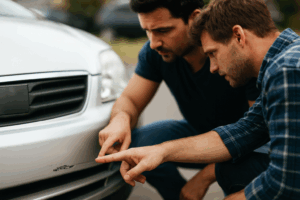
In Texas, auto insurance subrogation is a legal process that allows an insurance company to recover the amount it paid to its insured client for a loss, from the negligent party who caused it. Subrogation allows your insurance company to compensate you for the damages you’ve sustained first, and then seek reimbursement from the responsible party to recoup these costs.
This process ensures that you, as the insured party, receive your compensation promptly, while the task of pursuing the at-fault individual falls to the insurance company. This system also helps the insured to recover their deductible, and assists the insurance company in recouping their payout.
To subrogate a claim means the insurance company stands in the shoes of its policyholder to recover losses from the at-fault party. It essentially transfers the insured’s rights to make a claim against the responsible person to the insurance company.
Suppose an accident results in property damage, and your insurance company pays for your repairs. In that case, your insurer may later go after the driver who caused the accident to recover those costs. This process is referred to as auto insurance subrogation (often shortened to “subro”).
After paying a claim to its client, the insurer can invoke subrogation rights to obtain reimbursement from the party at fault. This process can include recouping the policyholder’s deductible and the amount paid out for the claim.
Subrogating the property damage portion of your accident claim allows you to separate your property damage claim from your personal injury claim, which can simplify the claims process and could potentially result in a quicker settlement.
Here are some specific reasons why you might choose to bifurcate your property damage and personal injury claims:
While choosing to subrogate the property damage portion of your accident claim may not be the ideal course of action for everyone, it can offer potential advantages. It’s important to engage with a knowledgeable insurance professional or legal advisor to understand the ramifications fully and make the decision that is best for your specific circumstances.

Like any process, subrogation has its advantages and disadvantages. Understanding these can help you make an informed decision about your approach to recovering damages after an auto accident.
Although subrogation offers several benefits and can streamline your property damage claim, it is not wholly without drawbacks. Always consult with a legal professional to fully understand your options and rights in an auto insurance subrogation claim.

When involved in a subrogation claim, your responsibilities largely involve cooperation and provision of necessary information. You are expected to:
If your insurer recovers the deductible amount from the at-fault party, they should return that amount to you. Remember, a subrogation claim is essentially handled by your insurer; your role is to support the process with proper and timely information.
At Thompson Law, we understand that navigating the complexities of auto insurance subrogation and property damage claims can be overwhelming, especially if you’re dealing with injuries from an accident. Our team of experienced legal professionals is here to guide you through the process, answer your questions, and advocate for your rights.
If you’ve been injured in an accident and have questions about subrogation, don’t hesitate to contact us. You can reach us at 1-800-LION-LAW (1-800-546-6529) or contact us via our web form to schedule your FREE CONSULTATION. Let us help you get your car fixed quickly, and obtain the maximum compensation you deserve.






Thompson Law charges NO FEE unless we obtain a settlement for your case. We’ve put over $1.9 billion in cash settlements in our clients’ pockets. Contact us today for a free, no-obligation consultation to discuss your accident, get your questions answered, and understand your legal options.
State law limits the time you have to file a claim after an injury accident, so call today.